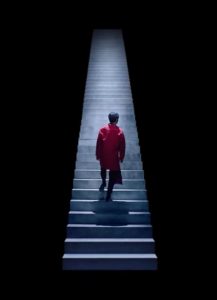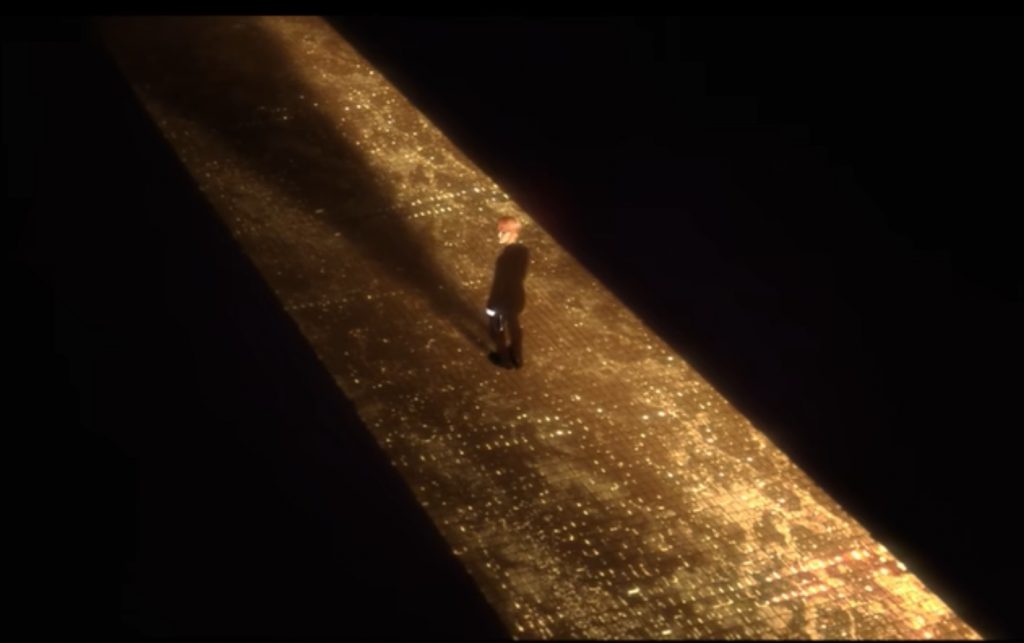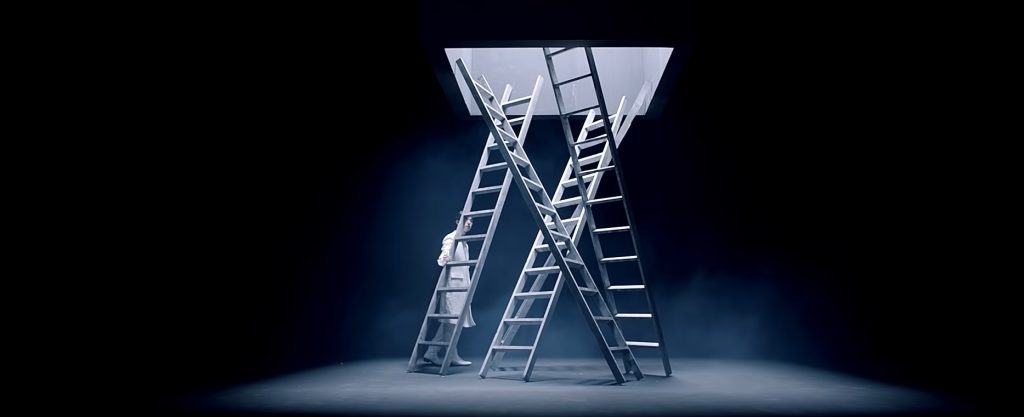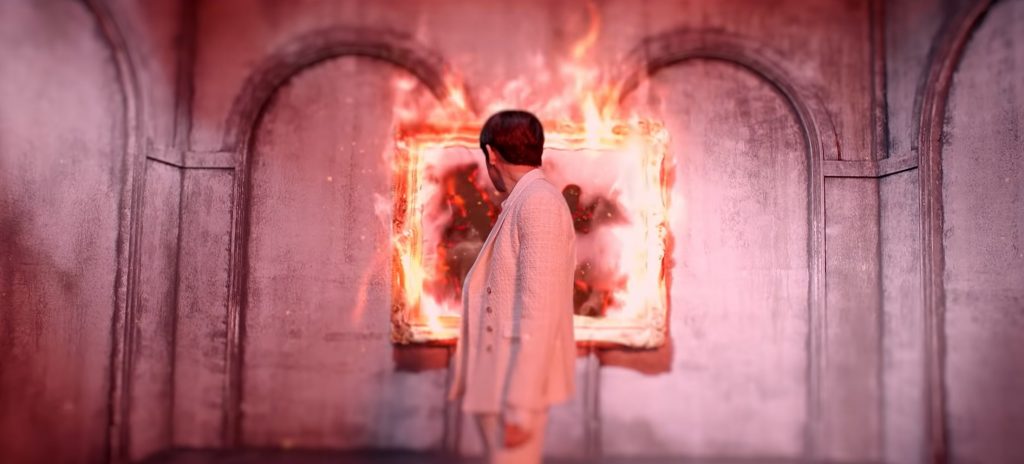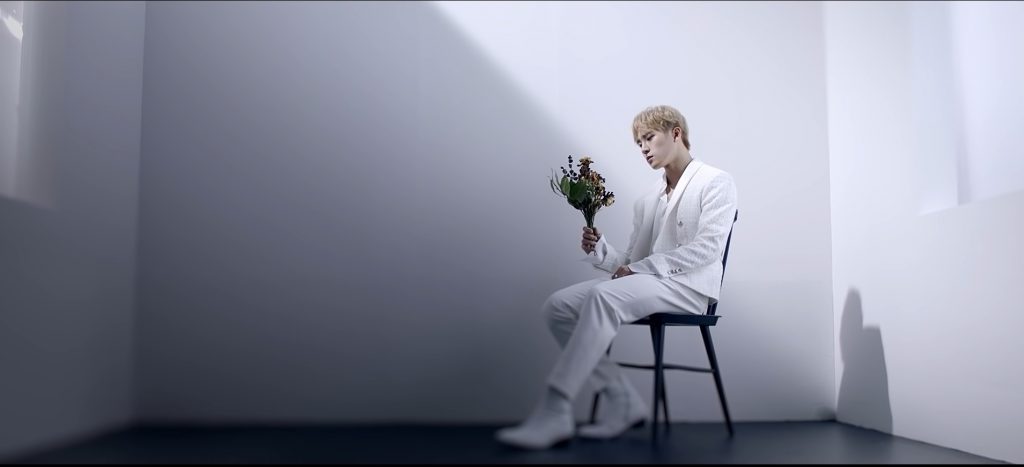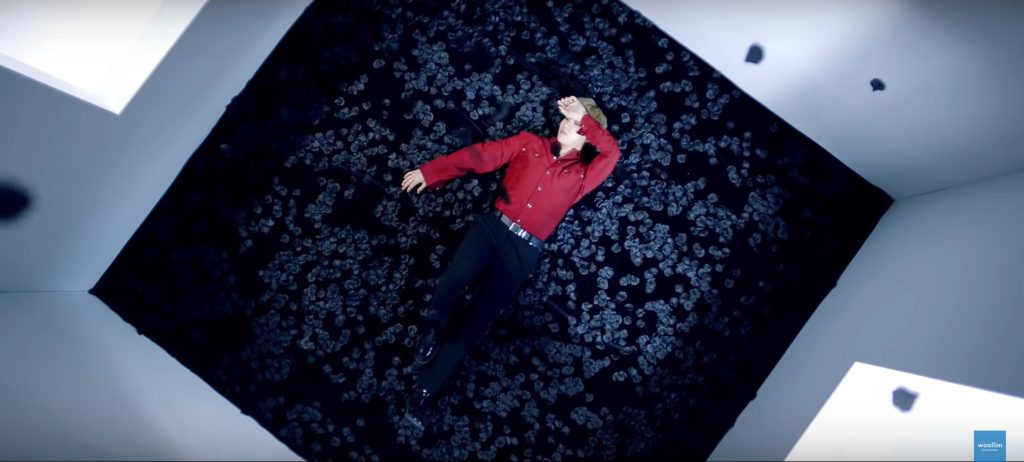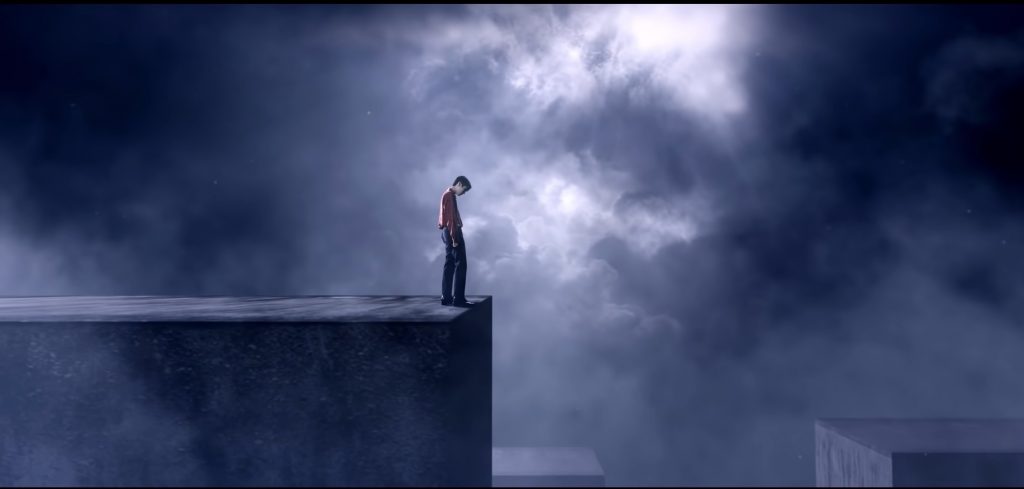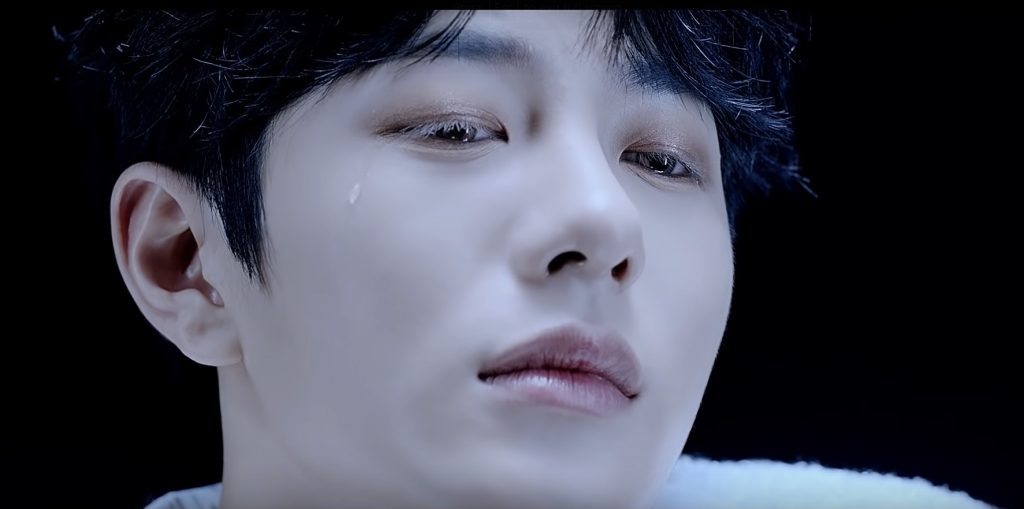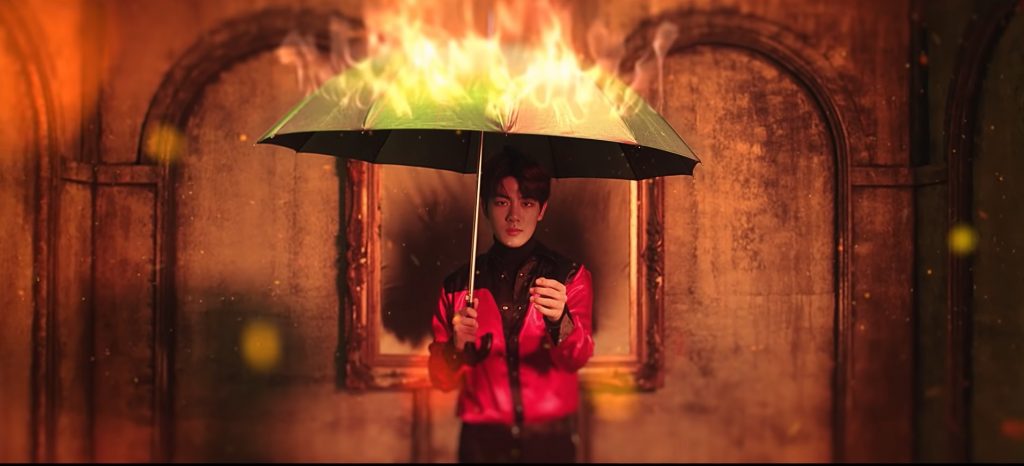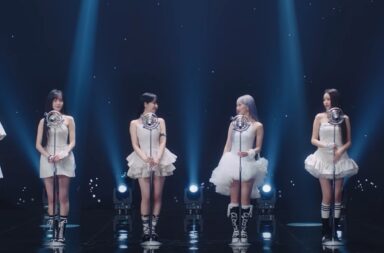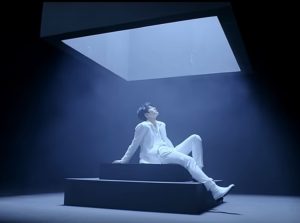
Woolim Entertainment‘s forgotten child, Golden Child, returned in November 2019 after a long 20 months with Re-boot — an apt title as the group did literally reboot its sound and image. Abandoning their bright, summer-y concept, “Wannabe” adopted the “darker” sound that was popular with boy groups in 2019. The change in musical direction was a success, earning Golden Child their first music show win. The group continues the trend in its latest re-package album and its title track, “Without You”.
With relatively simple sets and a surprisingly similar, sober aesthetic, neither MV is particularly striking when compared against the larger world of K-pop MVs or even against one another. But both are a stark contrast to Golden Child’s peppier music so far (such as “Spring Again“), and rich in meaning — once you know what to look for. Largely a performance MV, “Without You” uses its sets, camerawork and general aesthetic to offer a polished, artistic take on despair. Perhaps the only question is, is it a little too polished?
In “Wannabe”, Golden Child wanted to be one with “you” (“I wanna be wanna be you”). The lyrics intentionally left the identity of “you” ambigious. It could be a loved one or one’s own self. This undefined “you” was the song’s persona’s whole world — he wanted to drink it, fill his ears with it, and drown in an endless fantasy that would save him from this dark world. In “Without You”, he has failed to become one with “you”, and wanders aimlessly, begging desperately for “you” to take his hand. The song lays itself bare in its very first verse,
Who am I?
Who am I?
Who am I?
I lost myself,
Hold my hand and take my hand everywhere,
When the blurry takes me, hold me.
The MV opens with Bomin climbing a staircase amidst nothingness, and closes when he reaches the second step from the top — again, to nothingness. A staircase to nowhere. As Bomin climbs, the song’s persona questions who he (the persona) is, where he is going, and the scents, the heat, the memories that fill his mind. This is reminiscent of Jaehyun in “Wannabe”, standing on a golden pathway otherwise surrounded by nothingness. Neither image is particularly comforting, but the symbolism is clear. One walks up gray steps, hopeless and in despair, while the other stood on gold, on the way to becoming one with his savior, “you”.
This is an existential crisis at its peak.
I feel so empty now, my heart is empty now.
Was it just a dream? Every day I imagine you.

The song’s persona feels empty without “you”. The MV stresses upon this feeling through the use of vast, empty sets around the performing group, or individual members. The soundscape of the song is similarly spacious, and the combination leaves one with a slight disquiet, drawing the viewer into the persona’s despair and sense of emptiness.
Ah I’m trapped in my mind,
I just want my mind to be filled.
Call me, answer me,
Who is this I see in the mirror?
An entirely artificial background, and a complete disconnect from other people — including even each other, as the members don’t once make eye contact with one another — is used to further reinforce feelings of isolation, loneliness and utter despair. At different points in the MV, the members also have their eyes covered, whether by a blindfold, the use of shadows, or as part of the performance. The song’s persona is lost in his feelings and doesn’t seek to find a way out, even though there are times when light seems to shine though into his artificial world.
The MV closely follows the state of his mind. At first, the song’s persona is the move, constantly looking for “you” and says,
Woo, your heat heats me up.
I can’t stop
looking for you.
I’m back to this place again.
But later in the lyrics of the song, after constantly returning to the same place, a place without “you”, he gives up inside,
I stopped with everything,
I lost everything yeah
After a long run,
I’m back to this place again.
He acknowledges he is now running around pointlessly and the end is predictable.
I run everywhere,
even if the end is predictable anyway.
A painting bursts into flames, a bouquet of flowers — the last living things in his artificial world — is let go of, and black petals form a bed around our protagonist. He falls over the edge of a cliff. We see a single tear drop fall down his face otherwise expressionless face. An umbrella, the persona’s shelter from pain, burns. He stands helplessly under it, still reaching out for “you”.
With ten members, there’s plenty of opportunity to showcase despair, and the MV is steeped in easy-to-catch symbolism. Equally intriguing is the camera work, which keeps pace with the performance and the sound. The song opens with a more delicate piano, and gradually builds up to the hook, a long and winding falsetto, “without you”. The camera too begins with steady shots, ramping up its movement and tilting wildly to the sides once more dramatic synths hit in the build-up to the hook. Lights flash in blue and red. As the persona grows increasingly agitated, so does the MV, with the camera at its most frantic during the pre-chorus (if it can be called that), and the hook.

Interestingly, the song has no real structure — no bridge, clearly defined pre-chorus or even any melody — to speak of. It is only the falsetto hook that repeats itself, dividing the song neatly into two halves, the second of which is more energetic than the first. Rather than sound, the song, and thus the MV, relies on atmosphere and mood to create an immersive portrait of despair. Its sparse arrangement means Golden Child’s vocalists have to take on the task of holding our interest in the song, and they rise to the task beautifully.
What holds the song back from making a lasting impact however, is the lack of any concrete resolution or the release of tension. While its unusual structure is indeed appealing, the song builds up to a climax that never really comes.
This lack of resolution is a strength for the MV. In much the same way, the MV leaves its protagonist, and the audience, standing on a stark staircase and surrounded by an infinite nothingness, without any answers. It captures a moment of despair that is without beginning or end. We don’t see the song’s persona break down; he has already broken down. Nor do we see him pull himself back together. He just spirals deeper and deeper into despair. It is a compelling, if painful, moment to join him.
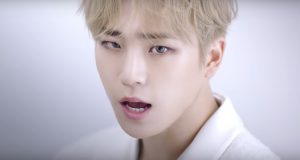
Given all the strengths outlined above, it’s hard to pinpoint why something feels off about the MV. I’d venture to guess that it is the very fact that it is perfect. The sophisticated MV for “Without You” lacks a certain rawness, realness, that would truly infuse it with a sense of utter hopelessness. The members are all perfectly styled and abundantly good-looking. They’re unapproachable, with not a hint of vulnerability in their tightly controlled veneer, and are therefore un-relatable. Similarly, the sets, camera angles and all the frantic movement — everything is perfectly in place and tightly under control.
But I’m nitpicking. All things considered, this is an excellent (if overly polished) release for a rising group. Golden Child have made a successful switch to a more mature concept. For Goldenness and for Woolim, the last two releases are proof that the group is versatile, and for the group, it is hopefully a chance to rope in a larger fanbase. It’ll be interesting to see where Golcha takes the narrative it started in “Wannabe” and continued in “Without You”, next.
(lyricskpop, YouTube, Images via Woolim Entertainment)
